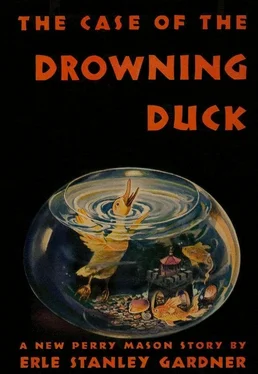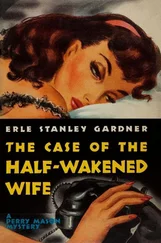“Nine hundred and ninety-nine chances out of a thousand, it means Gridley P. Lahey is a purely fictitious individual. The telephone number will probably be that of some large department store or some factory which employs several hundred or more workers.”
“Then it means that...”
“That the murder was premeditated,” Mason said, “that it was worked out to a split second in its timing. Whoever did it planned things deliberately so that Marvin Adams would take the rap.”
“And what does that mean?”
“Lots of things. Among others, it means that the search for the murderer can be narrowed into a very small circle.”
“How?”
“In the first place,” Mason said, “Marvin Adams was picked for a particular reason. That reason is that the person who picked him knew something Marvin doesn’t know himself.”
“You mean about his past?”
“That’s right. That person must have known about Marvin’s father, must have known that Milter had been working on the case.”
“Anything else?” she asked.
“Yes. It means the person knew about the experiment of the drowning duck.”
“What else?”
Mason said, “This is something that puzzles me. He knew somehow that the duck that was left in Milter’s apartment was going to be identified. Now, how did he know that?”
“He must have known that Witherspoon was going in to El Templo.”
“Witherspoon himself apparently didn’t know that until after I’d started. It was something he did on impulse unless...”
“Unless what?” she asked.
Mason’s lips tightened. “Unless the whole thing was deliberately planned in just that way by the one man who knew that the duck could and would be identified.”
“You mean — that it was—”
“John L. Witherspoon,” Mason finished for her.
“But, Chief, that’s preposterous.”
Mason said, “It might not be preposterous. He might have laid his plans to get Adams in a spot. He may have wanted to make Adams think he’d committed a murder.”
“But not an actual murder?”
“Perhaps not.”
“Then something must have miscarried about this man’s plans.”
“That’s right.”
“Where would that leave this man — in case he had made a mistake?”
“Right on the spot,” Mason said. “Legally, he might be able to show it wasn’t first-degree murder. It might be manslaughter. But he might have a hard time proving his point to a jury.”
Della Street’s voice was vibrant with feeling. “Well, why keep beating around the bush? Why not call a spade a Witherspoon?”
“Because of the laws about slander and libel. We won’t say anything until we can prove it.”
“When will that be?”
He said, “I don’t know. Perhaps we’ll sit tight, and let the district attorney at El Templo say it.”
They were silent for the rest of the trip to the office. Mason swung the car into the parking lot across the street from his office building. They crossed over, and Mason asked the elevator starter, “Is Paul Drake in his office?”
“Yes, he came in half an hour ago.”
They rode up in the elevator. Mason paused to poke his head into Drake’s office, said to the girl at the switchboard, “Tell Paul I’m on the job. Ask him to drop in and see me as soon as he gets a chance.”
Mason and Della Street walked down to the lawyer’s private office. Della Street was still opening mail when Drake’s steps sounded outside the door. His knuckles tapped a distinctive code knock.
Mason let him in.
Drake walked across to the big overstuffed leather chair and squirmed around in it so that he was sitting sideways, his legs drooped over the arm of the chair.
“Well, Perry, you called the turn on that one.”
“On what?”
“On the fact that after a case gets just so old, people begin to get careless and certain things come out in the open.”
“What have you uncovered?”
“Miss X is a Corine Hassen.”
“Where is she now?”
“Darned if I know, but we’re on her trail and it’s almost a cinch that we’ll be able to find her.”
“Is it a warm trail?”
“No. It’s cold as a frog’s belly, Perry. I can’t find anyone who saw her after the time of the trial. That’s a long time.”
Mason nodded. “The prosecutor managed to keep her out of it by reaching an agreement with the defense, that she could be referred to as Miss X. Under the circumstances, she was almost certain to get out from under and sit tight until it had blown over.”
Drake said, “Where there’s so much smoke, there must have been a little fire.”
“Meaning what?”
“Meaning that Latwell must have been playing around with her a bit. Incidentally, I can produce two witnesses who can give us something on that angle. Latwell knew her.”
“Intimately?” Mason asked.
“I don’t know. I do know that he’d been seen with her several times. Of course, the theory of the prosecution was that Adams knew about this, and therefore had dragged her name into it.”
“How old was she?” Mason asked.
“About twenty-five.”
“She’d be about forty-five now.”
“That’s right.”
“Attractive?”
“My correspondents telephone that her pictures, taken twenty years ago, indicate she was rather good-looking, not a knockout, you understand. As I understand it, her face was a little pinched around the eyes. Her figure was the distinctive thing about her. It was swell — twenty years ago. She was a cashier in a chocolate shop, candies, ice cream, light lunches, and things of that sort.”
“Just how did this Hassen girl disappear?” Mason asked.
“Well, she was living with her aunt. Her father and mother were both dead. She said she had an opportunity to get a job out on the Pacific Coast, that she had a boy friend who was always hounding her to marry him, that he was intensely jealous, and she was tired of the whole business, and intended to skip out and not leave any forwarding address, that she’d get in touch with her aunt after a while — more or less the same old story.”
Mason frowned. “I’m not so certain it is. When did she leave, Paul?”
Drake consulted a memorandum book. “Just about the time of the murder.”
Mason said, “Start on it as a regular disappearance, Paul. Look over everything, hospital records, unidentified bodies, and all that.”
“Around Winterburg City?” Drake asked.
“No,” Mason said. “Around Los Angeles and San Francisco for a start... and try Reno, particularly.”
“I don’t get you,” Drake said, frowning.
Mason said, “Let’s look at this thing logically. The big trouble is we get hypnotized by facts and start placing a false interpretation upon those facts because of the sheer weight of circumstances.
“Now in this case the evidence looked very dark against Horace Adams. Somewhere during the trial, his attorney got panic-stricken and became convinced that his client was guilty. No matter what happens, Paul, a lawyer should never become convinced of the guilt of his client.”
“Why?” Drake asked. “Are lawyers’ consciences that brittle?”
“It isn’t a question of a lawyer’s conscience,” Mason said. “It’s a question of doing justice to a client. Once you become convinced your client is guilty, you interpret all of the evidence in a false light and weigh it by false standards. You can see what happened in this case with the mysterious Miss X. Now, I’m acting on the theory that Horace Adams was innocent. In that case, the story he told about Miss X may well have been the truth. Then it’s quite possible Miss X did go to Reno to join Latwell.”
Читать дальше












